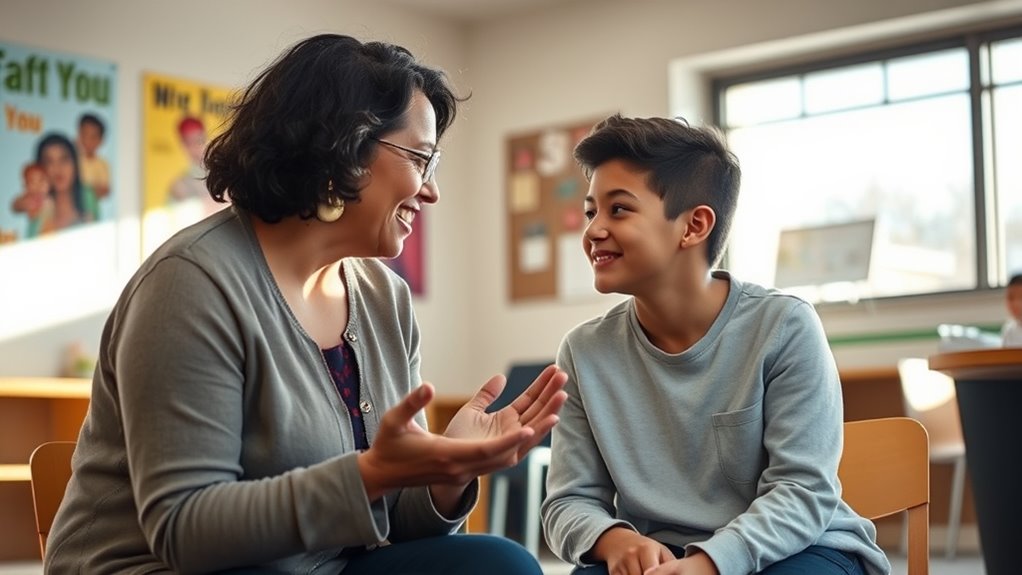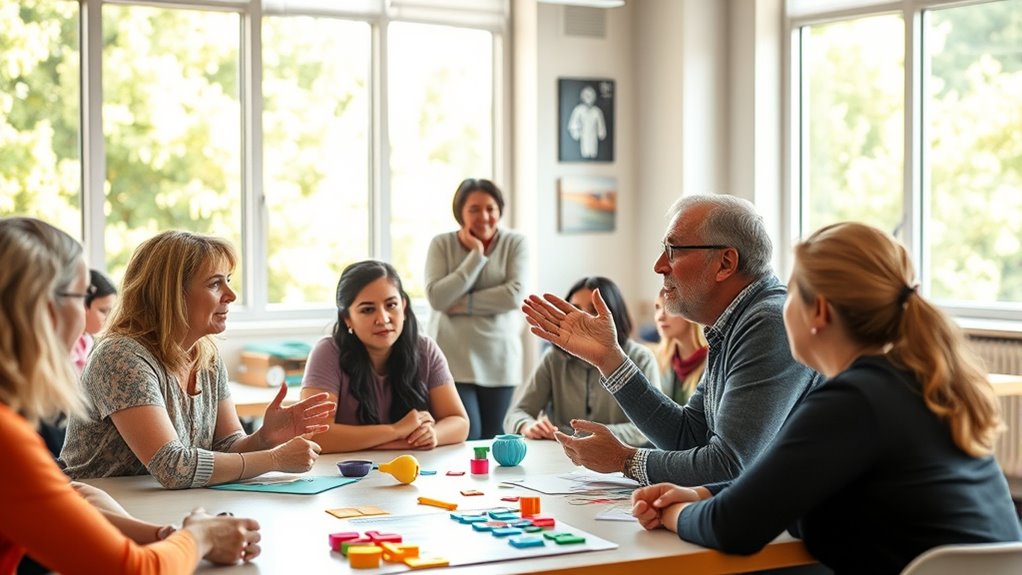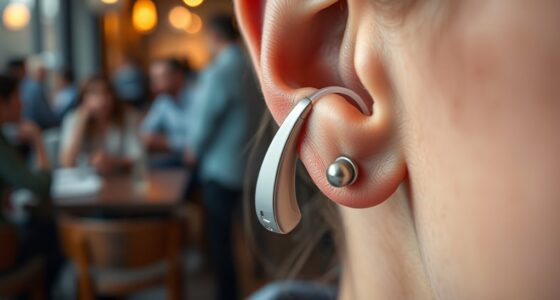Deaf mentorship helps you or your child develop strong language skills, cultural pride, and confidence. Deaf mentors serve as authentic role models, sharing their experiences and guiding you through communication and community involvement. They support emotional growth, resilience, and self-advocacy, fostering a positive Deaf identity. By connecting with mentors, you gain essential resources and community support. Keep exploring how these powerful relationships can transform your or your child’s journey and strengthen your connection to Deaf culture.
Key Takeaways
- Deaf mentors serve as authentic language models and cultural guides, fostering identity development and communication skills.
- They support resilience, confidence, and self-advocacy, empowering individuals within Deaf communities.
- Mentors accelerate language acquisition and cultural understanding through fluent signing and real-life experiences.
- They strengthen pride in Deaf identity, promote community engagement, and provide vital social and emotional support.
- Deaf mentorship enhances social inclusion, inspires leadership, and helps families access resources and networks.
The Role of Deaf Mentors in Childhood Development

Deaf mentors play a crucial role in childhood development by serving as authentic language models and cultural guides. When you engage with Deaf mentors, you gain access to real-life examples of Deaf communication and cultural traditions, which support your language growth and cultural identity. These mentors help you develop essential social-emotional skills, boosting your confidence and resilience from an early age. By demonstrating effective sign language and visual communication, Deaf mentors foster bilingual bimodal skills that are vital for social integration. Early exposure to Deaf mentors truly shapes your lifelong success and connection to the Deaf community. Additionally, water-based activities like aquatic exercises can support physical development and well-being, which align with the health benefits of physical activity. Incorporating automation in educational settings, such as Intelligent Tutoring Systems, can further enhance personalized learning experiences for Deaf children. Understanding the horsepower of electric dirt bikes can inspire innovative thinking and problem-solving skills, which are valuable in educational development.
How Mentoring Enhances Language and Communication Skills

Mentoring relationships considerably boost language and communication skills by providing consistent exposure to fluent signing and cultural context. When you work with a Deaf mentor, you’ll learn sign language naturally, improving vocabulary, sentence structure, and expressive abilities. Mentors model fluent signing, helping you develop more confident communication skills. They also introduce cultural nuances that deepen understanding and support bimodal bilingualism, enabling you to navigate both signed and spoken language. This consistent interaction fosters more natural language development and enhances your overall communication proficiency. Effective mentorship plays a crucial role in fostering language fluency and cultural understanding among learners. Additionally, exposure to sign language fluency during mentorship accelerates the acquisition of complex linguistic skills, making communication more seamless. Developing communication skills through mentorship also helps learners appreciate diverse communication styles and social norms within the Deaf community. Building strong interpersonal connections with mentors further enriches the learning experience, fostering trust and open dialogue.
Building Self-Confidence and Identity Through Mentorship

When young people connect with role models who share their lived experiences, they often develop a stronger sense of identity and belonging.
Deaf mentors help build self-confidence by demonstrating effective communication strategies and celebrating Deaf culture, showing youth that their identity is valuable.
These relationships boost resilience and foster positive self-perception, empowering deaf children and adolescents to embrace who they are.
Mentors support the development of self-advocacy skills, giving deaf youth the confidence to navigate social and academic environments.
Exposure to Deaf role models during formative years enhances pride in their identity and encourages active participation in Deaf communities.
Understanding performance metrics can help mentors tailor their support to better meet the needs of deaf youth, fostering more effective growth.
Additionally, exposure to Deaf role models during formative years can inspire deaf youth to pursue leadership roles within their communities.
Building trusting relationships with deaf youth is essential for creating a safe space where they feel comfortable exploring their identity and aspirations.
Creating inclusive environments that embrace diversity can further reinforce the importance of acceptance and belonging for deaf youth.
As a result, mentorship nurtures both self-confidence and a strong sense of identity, enabling deaf youth to thrive authentically.
Building connections with glamping sites that promote inclusivity can further support deaf youth in feeling welcomed and empowered.
Different Types of Mentoring Experiences and Their Outcomes

Different types of mentoring experiences shape the development and outcomes for deaf youth in unique ways. As a mentor, whether you’re a parent, peer, or part of a group, you influence how deaf children see their potential within Deaf culture. Parent mentors boost optimism and set higher expectations, encouraging children to dream big. Research shows that positive role models significantly impact self-esteem and motivation in deaf youth, fostering a resilient mindset. Group mentoring helps deaf youth expand their social networks and improve communication skills, fostering a sense of belonging. Peer mentoring creates relatable role models, promoting mutual support and shared experiences that reinforce identity. Deaf adults with mentoring backgrounds often report lasting impacts on personal growth and career success. Understanding grocery store hours can also be valuable for planning in various aspects of daily life, including community and social activities. Additionally, recognizing the importance of digital literacy ensures that deaf youth are equipped to navigate the online world safely and confidently. Developing communication skills is essential for empowering deaf youth to advocate for themselves and build meaningful relationships. Furthermore, incorporating positive reinforcement strategies can enhance the effectiveness of mentorship by encouraging continued growth and confidence. Ultimately, effective mentors believe in their mentees’ potential and provide positive guidance, helping deaf youth thrive within their cultural identity.
Resources and Programs Supporting Deaf Mentorship Initiatives

You can access a range of resources and programs designed to support deaf mentorship initiatives, like those from the National Deaf Center and Hands & Voices. These tools include online courses, guides, and training opportunities that help you develop effective programs. Additionally, exploring funding options and collaboration strategies can strengthen your efforts and expand your impact. Incorporating effective communication methods into your programs can also enhance engagement and success for mentees.
Mentoring Program Resources
Have you explored the wealth of resources available to support deaf mentorship programs? These tools and programs can greatly enhance your efforts in deaf mentoring by providing essential training, guidance, and community connections.
The National Deaf Center on Postsecondary Outcomes (NDC) offers online courses and downloadable guides to help you develop effective mentoring strategies for deaf youth. Programs like the SKI*HI Institute deliver curricula featuring deaf mentors, emphasizing communication and relationship-building skills.
NDC’s website also hosts family guides, role model resources, and success stories that promote best practices. Additionally, organizations such as Hands & Voices and the Deaf/Hard of Hearing Guides program supply tailored resources, training, and a supportive community to strengthen your deaf mentoring initiatives. Moreover, utilizing mentorship best practices can help ensure your program is effective and sustainable. Incorporating effective communication strategies into your mentorship approach can further improve engagement and understanding between mentors and mentees.
These resources are crucial for building sustainable, impactful programs. Incorporating Juice Cleanse and Detox knowledge, for example, can help mentors promote overall wellness and healthy habits among their mentees.
Funding and Collaboration Strategies
Securing funding for deaf mentorship programs requires exploring a variety of sources, including grants, government agencies, and private foundations dedicated to disability and cultural initiatives. To maximize resources, collaboration is essential. Partnering with organizations like Hands & Voices, the National Deaf Center, and local community agencies helps share costs and strengthen programs.
Developing clear policies, role descriptions, and training protocols guarantees funds are used effectively and mentorship quality remains high. Creative funding strategies, such as applying for specialized grants, engaging in crowdfunding, and forming partnerships with educational and health institutions, can also boost support.
Ongoing collaboration among families, professionals, and Deaf community members enhances resource utilization and sustains mentorship initiatives for long-term impact.
Benefits for Families and the Community

Deaf mentorship helps strengthen family bonds and boosts confidence by connecting families with positive role models and shared experiences.
It also creates opportunities for communities to come together, fostering social inclusion and cultural pride.
When families and communities support each other, everyone benefits from increased resilience and empowerment.
Strengthening Family Connections
How do Deaf mentorship programs strengthen family connections? They give your family access to relatable role models who share your communication style and cultural background. When family members connect with a Deaf mentor, they gain confidence and optimism in supporting your child’s language development and cultural identity.
Deaf mentorship also helps your family access essential resources, networks, and support systems that boost your overall well-being. These positive relationships foster better communication, resilience, and advocacy skills within your family and the wider Deaf community.
As you engage with mentors, you’ll feel more involved and satisfied with your child’s educational and social experiences. Overall, Deaf mentorship creates a stronger, more supportive family environment rooted in shared understanding and community connection.
Building Community Support
Building community support through Deaf mentorship programs enhances the connections that families and the broader community share. Deaf mentors serve as essential cultural and linguistic bridges, fostering understanding and appreciation of Deaf culture.
By engaging Deaf mentors in community outreach, you contribute to normalizing Deaf identity, creating more inclusive environments. These programs help build strong community networks that offer emotional and social support, reducing feelings of isolation for families.
Families with access to Deaf mentors report greater confidence in steering educational and communication challenges. Additionally, community-supported mentoring initiatives promote collective advocacy, benefiting both families and Deaf individuals.
As you support these programs, you help strengthen the fabric of the Deaf community, encouraging acceptance, awareness, and unity for everyone involved.
Challenges and Strategies for Connecting Mentors With Families

Connecting mentors with families involves overcoming several challenges, from securing sustainable funding to establishing strong relationships built on trust.
To improve family engagement, consider these strategies:
- Seek grants and creative funding sources to support programs and guarantee deaf mentors are compensated, trained, and clear about their roles.
- Develop strong policies and procedures that foster trust and demonstrate professionalism.
- Recruit open-minded, knowledgeable deaf mentors skilled in diverse communication methods to connect effectively with families.
- Prioritize ongoing relationship-building and cultural sensitivity, regardless of whether families are in crisis or doing well.
Personal Perspectives: Insights From Deaf Mentors and Mentees

Personal stories from Deaf mentors reveal the profound impact mentorship has on both their lives and those of their mentees. Many share how overcoming communication barriers helped them develop resilience and a strong sense of identity.
As a mentee, you’ll notice increased confidence and self-esteem as you connect with someone who truly understands your experiences. Deaf mentors emphasize the importance of cultural connection and language sharing, creating a safe space where you feel a genuine sense of belonging.
These relationships often lead to emotional growth and inspire future aspirations. Both mentors and mentees experience lasting personal and professional development, proving that Deaf mentorship isn’t just about guidance—it’s about transforming lives through shared understanding and empowerment.
Promoting Awareness and Expanding Mentoring Opportunities

Raising awareness about deaf mentorship plays a pivotal role in inspiring more Deaf adults to step into guiding roles and expanding available opportunities. When you highlight success stories and share videos, you help others see the impact of deaf mentorship and motivate more community connections.
To promote this, consider:
- Developing programs that connect Deaf mentors with families through targeted outreach.
- Securing funding and training to support new mentors.
- Partnering with organizations like Hands & Voices and the National Deaf Center.
- Running campaigns that showcase cultural relevance and positive outcomes for Deaf youth.
Frequently Asked Questions
What Does a Deaf Mentor Do?
A Deaf mentor shares their lived experiences, language, and cultural knowledge to support you and your family. They model effective communication strategies and demonstrate success within the Deaf community, inspiring confidence.
They serve as role models, helping you develop a strong identity, social skills, and a positive self-image. Additionally, they guide you through community resources, educational options, and social opportunities, empowering you to thrive within the Deaf culture.
What Is the Importance of Mentorship Programmes?
Mentorship programs are a game-changer, shaping futures in ways you can’t imagine. They give you a trusted guide who understands your world, boosting your confidence and sense of identity.
You’ll develop essential social and academic skills, all while feeling more connected to your community. These programs can transform your outlook, opening doors to endless opportunities, and helping you navigate challenges with resilience—making your journey brighter and more empowering every step of the way.
What Is the Importance of Deaf Talent?
Deaf talent is essential because it provides authentic role models who show you that success within Deaf culture is possible. When you see Deaf professionals and creators thriving, it boosts your confidence and sense of identity.
Their visibility challenges stereotypes, promotes understanding, and inspires pride. Supporting Deaf talent helps grow a strong community, encourages leadership, and creates opportunities for future generations to excel, innovate, and lead.
What Are the Benefits of Deaf Awareness?
Think of deaf awareness as a bridge that connects worlds. By increasing your understanding of Deaf culture, you create a more inclusive environment where everyone feels valued.
It helps you communicate better, reduces stereotypes, and fosters respect. With greater awareness, you open doors to resources and opportunities for Deaf individuals, making society more welcoming.
Ultimately, it’s about building a community where diversity is celebrated and barriers are broken down.
Conclusion
By embracing deaf mentorship, you open doors to brighter futures and richer connections. When you support these meaningful relationships, you gently nurture confidence, identity, and communication skills. Together, you help create a world where every deaf child feels seen, heard, and valued—like a delicate bloom unfolding in the sunlight. Your involvement weaves a tapestry of hope and understanding, guiding young hearts toward a more inclusive and compassionate tomorrow.










